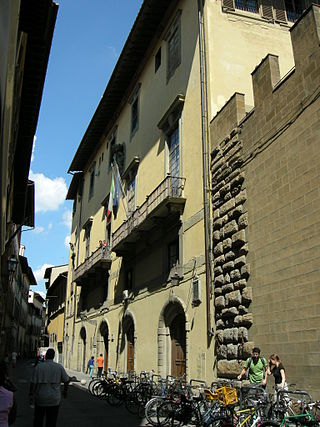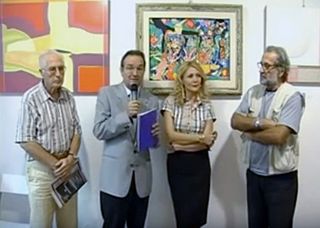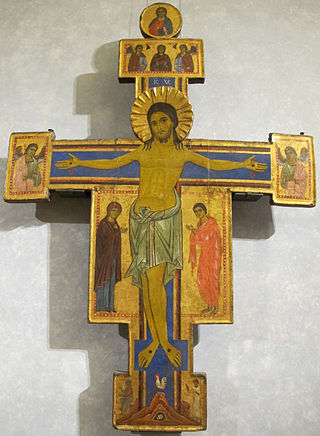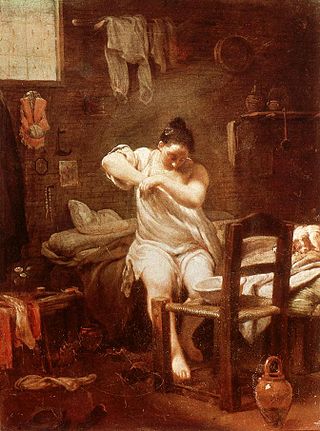
Teodulo Mabellini was an Italian composer.

The National Central Library of Florence is a public national library in Florence, the largest in Italy and one of the most important in Europe, one of the two central libraries of Italy, along with the Biblioteca Nazionale Centrale di Roma.
Quinto Martini (1908–1990) was an Italian artist and writer, born in Seano, Tuscany.

The Biblioteca Riccardiana is an Italian public library under the aegis of the Ministry of Culture, located inside the Palazzo Medici Riccardi at 10 Via de’ Ginori in Florence, in the neighborhood comprising the Mercato Centrale and the Basilica di San Lorenzo. Its main feature is preserving books collected by members of the Riccardi family and making them available in the very same rooms that were originally dedicated to that purpose. So, still today the library boasts the magnificent bookshelves, neatly carved and gilded, that create the atmosphere of a late-seventeenth-century patrician library, whose main features have all been kept intact.

Lucia Casalini Torelli (1677–1762) was an Italian painter, active in Bologna. The wife of painter Felice Torelli, she was the mother of painter Stefano Torelli. She was born in Bologna, where she trained under Giovanni Gioseffo dal Sole.

Irene Parenti Duclos (1754–1795) was an Italian painter and poet. Her work as an expert copyist of old master paintings was highly valued in her era, and brought her honors from several Italian art academies. Moreover, she achieved particular renown as a pioneer in the revival of encaustic painting.

Vittorio Matteo Corcos was an Italian painter, known for his portraits. Many of his genre works depict winsome and finely dressed young men and women, in moments of repose and recreation.
Marsha Steinberg is a Florentine artist, whose works include drawings, etchings and paintings. She is Coordinator of the Studio Art Program at the California State University Program, Florence and is professor of painting at the Italian International Institute, Lorenzo de' Medici in Florence, Italy.

Mauro Marrucci was an Italian artist born in Volterra, Italy on December 18, 1937, by artisans parents and he died November 15, 2014, in Grosseto. Since 1950 he is acting as the Alabaster craftsman and wood and began his artistic research, released by academic schemes, as a graphic designer and painter and makes experiences in the field of sculpture. In 1861 he won first teaching assignment in Tuscany where he continues to practice as a graphic designer, painter and designer. Since 1973, public writings of artistic teaching and non-fiction. In December 1974 on Public Education of drawing the essay "The educational dialogue through the work of art." He also collaborates with the magazine School and cities. In 1982 he moved to Milan to teach Design and Art History at the XIII High School. In 1986 he held the chair of architecture at the Art School "Pietro Aldi" in Grosseto until retirement. From 1957 to 2011 he took part in demonstrations in graphics and painting in Italy and abroad, receiving reports from the most qualified critics and several awards.
The following is a timeline of the history of the city of Pistoia in the Tuscany region of Italy.
The following is a timeline of the history of the city of Prato in the Tuscany region of Italy.

The Reale Museo di Fisica e Storia Naturale was an Italian museum founded on 22 February 1775 in Florence that survived until 1878, when its collections were split up in various Florentine museums.

The Master of the Bigallo Crucifix or Bigallo Master was an Italian painter active around Florence in the first half of the 13th century. He ran one of the first fully organized workshops before Cimabue, specializing in large painted crucifixes for churches, one of the main formats for panel paintings at the time. His notname comes from one of these in the Museo del Bigallo in Florence. A similar work is in the Palazzo Barberini site of the Galleria Nazionale d'Arte Antica museum, Rome.

Studio fotografico Vasari it is one of the oldest Italian companies operating in the field of photography.
Biblioteca e Archivio del Risorgimento [Library and Archive of the Risorgimento], located in the Historic Center of Florence, houses regional collections relating to the Italian unification and the mid-18th century.
Enrico Maccioni is an Italian painter of contemporary art.

Woman Searching for Fleas, The Flea or Woman Getting out of Bed is a 1710-1730 oil on copper painting by Giuseppe Maria Crespi, a painter from Bologna. The main version is now in the collection of the Uffizi in Florence, whilst variants survive, including one at the Museo nazionale di palazzo Reale in Pisa, also originating in the Guardaroba of the Grand Dukes of Tuscany.

Holy Family with the Infant Saint John the Baptist and Saint Mary Magdalene is a 1508–1512 oil-on-panel painting by the Venetian painter Palma Vecchio. It was in archduke Leopold William of Austria's collection in Brussels from 1653 to 1662 before being moved to the Imperial Galleries in Vienna, before finally being exchanged for another work with the Uffizi in Florence in 1793, where it is now inventory number 950.













